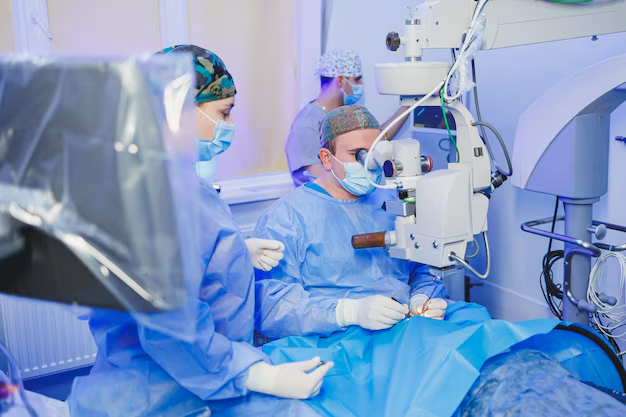Your Guide to Are You Awake During Cataract Surgery
What You Get:
Free Guide
Free, helpful information about Cataract FAQ and related Are You Awake During Cataract Surgery topics.
Helpful Information
Get clear and easy-to-understand details about Are You Awake During Cataract Surgery topics and resources.
Personalized Offers
Answer a few optional questions to receive offers or information related to Cataract FAQ. The survey is optional and not required to access your free guide.
What to Expect When You're Awake During Cataract Surgery
Stepping into the world of cataract surgery can be daunting, especially with questions buzzing around like, "Will I be awake during the procedure?" The simple answer is yes, you will be. But there's so much more to this story. Let's dive into what this means for you, why it's the chosen method, and what to expect before, during, and after your surgery.
Understanding Cataract Surgery
What Is Cataract Surgery?
Cataract surgery is a common procedure aimed at removing the clouded lens of your eye, which is then replaced with a clear, artificial lens. This surgery helps restore clear vision and is a transformative procedure for many experiencing vision loss due to cataracts.
Why Are Patients Awake?
One of the most surprising elements is that patients are awake during cataract surgery. Here’s why:
- Local Anesthesia: The procedure involves local anesthesia—eye drops or a small injection numbs the eye, ensuring you feel no pain.
- Quick Procedure: The surgery itself is quick, usually lasting about 10 to 20 minutes, making general anesthesia unnecessary.
- Patient Response: Your surgeon may need you to follow instructions or fixate on a point during the procedure, which is easier when you’re awake.
The Procedure: What to Expect
Pre-Surgery: Getting Ready
Before the procedure, there are steps to prepare you:
- Medical Evaluation: You'll undergo a thorough check-up to make sure you’re fit for surgery.
- Medication Adjustments: Some medications might be adjusted before surgery, so consult with your healthcare provider.
- Fasting: Typically, you'll need to fast a few hours before the surgery.
During Surgery: What Happens?
Here is an overview of what happens while you're awake but comfortable:
- Anesthesia Application: Your eye will be numbed using drops or an injection.
- Pupil Dilation: Eye drops will dilate your pupil, providing better access for the surgeon.
- The Procedure:
- A small incision is made at the edge of your cornea.
- The cloudy lens is broken up and removed.
- An artificial intraocular lens (IOL) is placed.
- No Pain, Just Pressure: You might feel slight pressure but remain pain-free.
Post-Surgery: Immediate Aftercare
Right after surgery, you'll be:
- Monitored Briefly: Staff will monitor you to ensure there are no immediate complications.
- Discharged the Same Day: Cataract surgery is an outpatient procedure.
- Advised on Activity: You'll receive instructions to protect your eye and avoid strenuous activity.
Addressing Common Concerns
Is Being Awake Uncomfortable?
While being awake may sound intimidating, most find it surprisingly comfortable. The numbing drops ensure you don't feel pain, and the entire process is over rather quickly.
Can I Move My Eye?
Your surgeon will instruct you on where to look, ensuring your eye stays steady. Although you’re awake, the feeling of pressure and sedation helps in minimizing the urge to move your eye.
What If I Blink?
Worried about blinking? Special devices are used to keep your eyelids open, so you won’t have to worry about unintentionally closing your eyes mid-surgery.
Special Considerations
Sedation Options
For those particularly anxious, mild sedatives can be administered to help you stay relaxed without falling asleep. This option lets you remain calm while conscious enough to follow instructions.
Communication With Your Surgeon
Feel free to discuss any anxieties with your surgeon beforehand. Open communication can help tailor a strategy to keep you most comfortable.
Post-Operative Care: The Road to Recovery
What to Expect After Surgery
After surgery, recovery is equally important to ensure the best results:
- Vision Improvements: Many notice vision improvements within a few days.
- Protective Gear: You’ll likely wear an eye patch or shield for protection.
- Eye Drops: Antibiotic and anti-inflammatory drops will be prescribed to prevent infection and reduce swelling.
Lifestyle Adjustments
Brief lifestyle changes may include:
- Avoiding Water in Your Eye: For a few days, keep water from entering your eyes.
- Gentle Activities: Avoid strenuous activities, bending over, or heavy lifting immediately after surgery.
- Follow-Up Visits: Regular check-ups will ensure your eye heals properly and your lens is correctly positioned.
Key Takeaways 📌
To wrap up, here are some crucial points to remember about cataract surgery and being awake during the process:
- Awake and Comfortable: You will be awake, allowing for a quicker, more responsive procedure with local anesthesia.
- Quick and Painless: The surgery is brief with minimal discomfort, focusing on swift recovery.
- Communication Is Key: Share your worries with your healthcare provider to address them effectively.
- Plan for Recovery: Follow post-care instructions diligently for optimal healing and visual outcomes.
Final Thoughts
Cataract surgery, while involving an awake state, offers a straightforward path to clearer vision. Ensuring you're informed about what to expect can make a world of difference in your experience. Approach this medical journey with confidence, and soon, clearer views await just around the bend. 🌟
What You Get:
Free Cataract FAQ Guide
Free, helpful information about Are You Awake During Cataract Surgery and related resources.

Helpful Information
Get clear, easy-to-understand details about Are You Awake During Cataract Surgery topics.

Optional Personalized Offers
Answer a few optional questions to see offers or information related to Cataract FAQ. Participation is not required to get your free guide.


